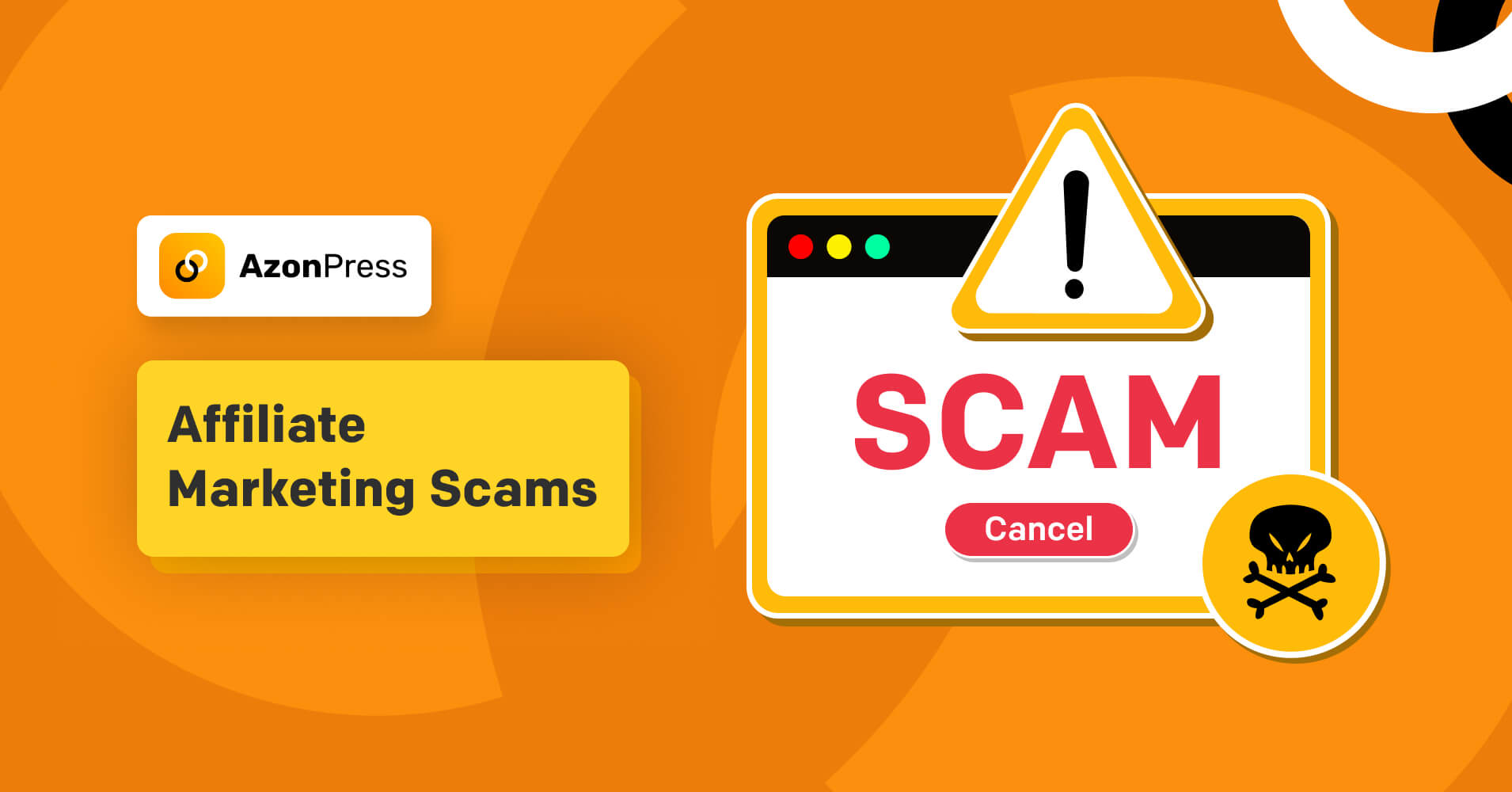
Affiliate Marketing Scams: Identifying & Avoiding Common Pitfalls
Make $10,000 in a week, no skills needed!”
Sounds familiar?
If you’ve ever searched for affiliate marketing opportunities, chances are you’ve come across these flashy headlines. And let’s be honest, at some point, we’ve all been curious. But here’s the truth: most of these are nothing but scams wrapped in sugar-coated promises.
Affiliate marketing is a growing industry with genuine opportunities, but unfortunately, it also attracts scammers who target both affiliate marketers and businesses. From get-rich-quick schemes to shady tracking tricks, the traps are everywhere.
In this article, I’ll walk you through some of the most common affiliate marketing scams. Whether you’re just starting out or already running affiliate campaigns, knowing these scams can help you stay safe and avoid costly mistakes.
What is affiliate marketing – Is it legit?
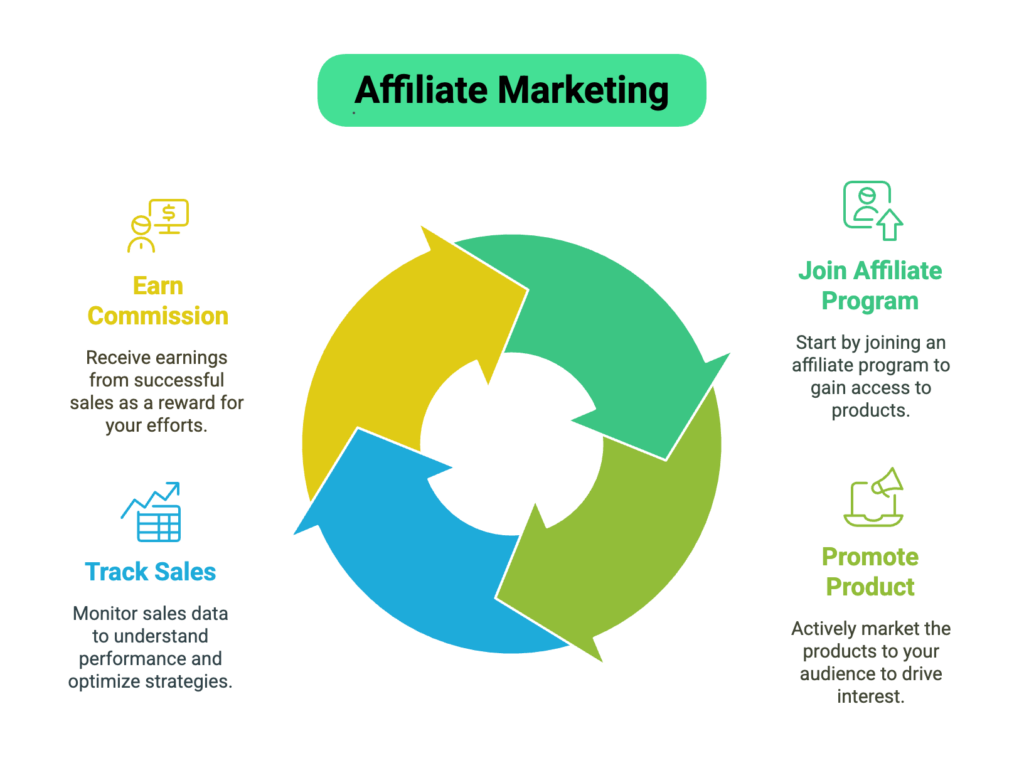
Affiliate marketing is very popular and legitimate for making money with competitive flexibility. The concept of affiliate marketing is simple and straightforward: Join an affiliate program, get a unique link, promote the products, and earn a commission for each sale made through your links. That’s all.
Unfortunately, affiliate marketing is often covered with scams, and you must be aware of affiliate marketing scams to get rid of them. However,
- It’s legal to make money online if you obey your country’s affiliate marketing rules and regulations.
- It’s also ethical to disclose yourself as an affiliate marketer and promote other products that you believe will be helpful for the audience.
The real question is, what are the actual scams in these fields? To help you better understand, we have shared some common affiliate marketing scams that target both affiliate marketers and businesses.
Affiliate marketing scams targeting affiliate marketers
Affiliate marketing itself is not a scam. It’s true that you can make money with it, but for that, you need time and effort. Like other fields, it’s also a victim of some fraudulent activities. Here are some common ones that you can see:
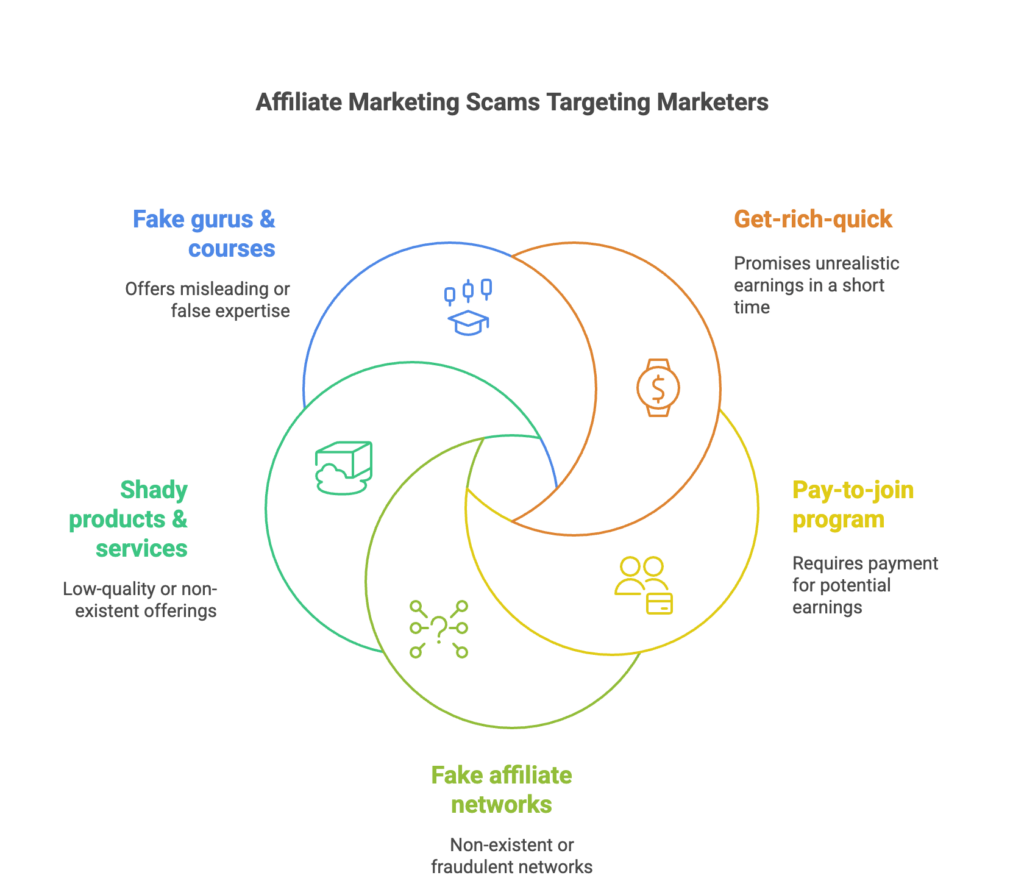
Get-rich-quick schemes
This is the most common scheme that you will find everywhere. If you are looking to join an affiliate program, you must have come across an opportunity like this. They promise you will get rich overnight. Such programs lure you with the idea that you can make so much money by joining the program.
The best way to identify scams is to look for those who claim you can earn thousands of dollars within a week, with no skill needed, and pressure you to join and promote products. Plus, they will not provide any guidelines on promoting and earning a commission after a sale made through your referral.
Pay-to-join affiliate programs
Many affiliate programs charge an upfront fee to join, which is often a red flag. If a program requires you to pay money to become an affiliate, it’s likely a scam. Joining as an affiliate partner with any brand should be free, as there is no cost associated with promoting the brand. If a program offers a joining fee in exchange for high commissions, consider it a scam.
These programs primarily target new members like you to profit from their fees, rather than focusing on actual product promotions. They typically do not provide promotional materials to help affiliates succeed.
Fake affiliate networks
You must be well-known with the popular affiliate networks Amazon Associate, ShareASale, CJ Affiliate and more. However, many fake affiliate networks look like real and are designed to steal your personal information and never pay you commission or anything else.
They often clone real websites and testimonials to build trust among affiliate marketers. So, before joining any affiliate network, make sure it is authentic. If you have any questions, you can post on the affiliate communities’ social media to ask about the program’s authenticity.
Shady products and services
It’s tempting to promote products for a high commission without bothering about product quality. Promoting shady products and services may help you earn a lot of commission but will damage your brand reputation. It will affect you in the long run; if the audience experiences terrible from you, then they will never trust you again.
So, as much as possible, try not to promote shady activities that will never be used for yourselves. If you encourage people to use any products or services, research them well, as they can be helpful, or try them yourself. Remember, if readers find you can’t keep your promise, they will call you a fraud.
Fake gurus and courses
In the affiliate marketing industry, a common and widespread scam involves fake gurus selling courses that promise to make you rich overnight. These people pretend to be experts but have no real-life experience in that field. Their main goal is not affiliate marketing but selling the courses they make.
These fake influencers make low-quality and underwhelming courses or training sessions and do not deliver anything like promised. As an affiliate marketer, your role is to promote it by saying anyone can get rich with this. Ignore promoting those fake gurus; instead, find good instructors or courses that are really beneficial for others. Look for influencers who:
- Don’t make overpromised.
- Provide proper knowledge and valuable content that is really helpful for the readers.
- Offer free introductory courses before selling the main courses to demonstrate their expertise.
- Have their own real success stories on social channels, Reddit and forums.
Affiliate marketing scams targeting businesses
Now, it’s time to discuss the other side of the coin. Along with affiliate marketers, businesses also fall victim to scams, which can cause financial loss. Below are some of the scams that are commonly faced by businesses. Every business should be aware of these before forming a partnership with affiliates.
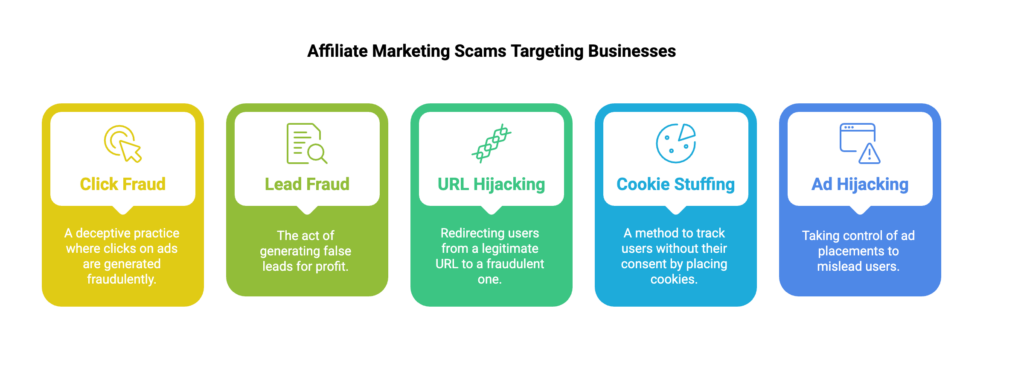
Click fraud and bot traffic
Click fraud and bot traffic are significant concerns in online marketing. Bot traffic is fake or non-human traffic directed to your sites; scammers often use this tactic to generate impressions and earn a commission. They try to believe the traffic you get because of them and make you pay them for that unreal traffic.
As a result, you end up paying for fraudulent affiliate traffic generated by boots that have no value to your business. This ultimately damages your affiliate marketing budget and also prevents you from achieving your expected goals.
Lead and transaction fraud
Fake signups, purchases and sales are generated just to earn a commission, which hurts businesses more. Scammers steal credit card information or create dummy payment accounts to make these fraudulent transactions.
Once a fake sale occurs, the affiliates become eligible for commission; however, the business does not receive any revenue from that sale. As a result, the business may sometimes need to refund the real cardholder for the fraudulent transaction. This can severely damage the business’s reputation, as customers may think the company is involved with this.
Get access to our exclusive offers and pro tips!
URL hijacking
URL hijacking is a most common scam that directly affects your website’s search engine optimization strategy. Fraud affiliates register domain names similar to your brand domain name to perpetuate this scam. For example, if your domain name is flowerbd.com, a scammer will register it as flowrbd.com (missing e-letter), targeting users who accidentally forget to type “e” and may land on the fake website.
Here, the real game begins when they land on the fake website, then will automatically be redirected to your real website. In that case, your site will get unexpected traffic, and the phoney affiliate will earn a commission even though they did nothing for that traffic. This negatively impacts your brand’s online presence and your search engine rankings.
Cookie stuffing
Cookie stuffing is a malicious technique used by scammers to earn unfair commissions. Where fraud affiliates secretly set cookies on users’ devices without their knowledge and contain affiliate IDs.
Its result is that if users somehow visit your websites later and make a purchase, you have to pay them the commission for that, even though they have no role in that sale. This is totally unfair and violates the rules of affiliate marketing.
Ad hijacking and website cloning
In this type of scam, scammers create fake ads similar to your company’s real ad. When people search for your brand, this fake ad will appear along with the real one. Users who click on counterfeit ads will land on a landing page created by scammers, similar to your website’s.
Once Scammers convince them to click on the buy now button, and they click to make a purchase, they are automatically redirected to your real website, and sales are made. In that case, you need to pay a commission for the sale that used to happen on your site through your real ads.
Protective measures for avoiding affiliate marketing scams
Now that we have discussed some most common affiliate marketing scams that affect both the business and affiliate marketers. Before starting an affiliate program or joining as an affiliate, you must take some protective measures to avoid this kind of affiliate marketing scam.
Here are a few tips that help you to identify a legitimate affiliate marketing program and avoid scams.
Join a reputable affiliate program
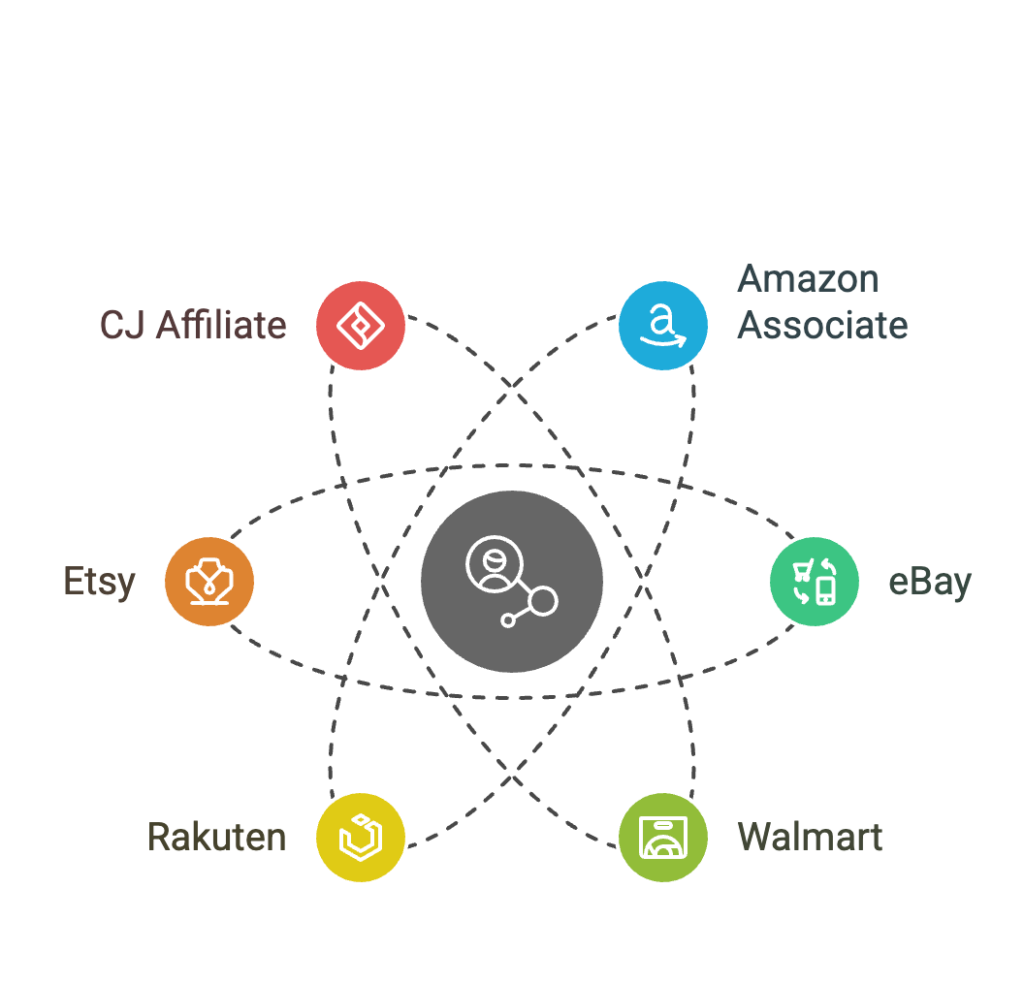
The first step to avoiding scams as an affiliate marketer is joining a reputable affiliate program. You have to look for the best affiliate marketing program that is known and has been in this industry for a long time. For example, Amazon Associate, eBay, and Rakuten the famous affiliate programs join which are popular and maintain affiliate rules and regulations. Try to avoid programs that make unrealistic promises and offer low commission and short cookie duration time.
Ask online affiliate marketing communities
The best way to verify whether an affiliate program is real or fake is to ask online affiliate marketing communities. Ask about its legitimacy on social media platforms like Facebook groups, LinkedIn, Twitter or Subreddit. If you receive positive feedback about the program, it may be worth trying. However, if the responses are negative, it’s best to search for another program.
Promote familiar products and services
It’s better to promote products or services that you are knowledgeable about. Before promoting anything, take the time to research it thoroughly. If possible, try using the product or service yourself. By experiencing it firsthand, you will have a better understanding to share and can provide accurate details in your promotion. This approach helps maintain your reputation and ensures that you are not endorsing any low-quality products.
Monitoring and analytics
When you launch any affiliate marketing campaign, always monitor your site’s traffic on analytics. A sudden spike of traffic may be the reason for affiliate marketing scams. Track whether this traffic is coming from any suspicious channels where you are not promoted.
Additionally, monitor the conversion rate, the percentage of visitors who come to your sites and how many of them click and buy.
Legal safeguards
Before starting affiliate marketing as a business owner, try to ensure your company take legal security measures to avoid such kind of fraudulent activities. Such as singing any anti-fraud policies. As an affiliate marketer, look for an affiliate program that prioritizes fraud prevention to protect both you and your business.
Education and awareness
Awareness is essential. No matter how skilled you are at promoting products or launching an affiliate marketing campaign, you must be informed before taking any action. As a business owner, it’s important to educate your employees on how to recognize affiliate scams. If you’re a marketer, make sure you have a solid understanding of how to identify legitimate affiliate programs. If something doesn’t seem right, it’s best to walk away.
Click here to discover affiliate marketing tool to boost your income
How to start affiliate marketing?
We all look for a second income source that will generate earrings without putting extra pressure on our daily lives, and affiliate marketing can be your excellent choice for this. To keep you (who are interested in affiliate marketing) in mind, the WPManageninja team developed an affiliate marketing plugin, AzonPress, that lets affiliate marketers start their affiliate marketing journey like Pro.
Success in affiliate marketing mostly depends on how well you convince your audience. AzonPress is what you need for that; its excellent product tables can be your great support to showcase your affiliate products. What makes it stand out is its ability to create high-converting product displays, such as comparison tables, product grids, and best-seller lists, without requiring an Amazon API key. This is a game-changer for many affiliate marketers who face API restrictions or are just starting out.
With smooth integration through shortcodes and Gutenberg blocks, AzonPress makes it easy for users to insert affiliate products anywhere on their site while maintaining a visually appealing layout. Its flexibility, ease of use, and API-free functionality make it a strong contender among Amazon affiliate plugins.
Manage links, create product tables, and comparison tables, and increase your affiliate revenue
Ready to overcome affiliate marketing scams?
Affiliate marketing can be an excellent option for businesses and affiliate marketers to boost their earnings. However, in the digital world, there are inherent risks, including cybersecurity threats and credit card fraud. Affiliate marketing scams are similar. But if you overcome this, there is a great opportunity ahead.
In this blog, we try to give you proper knowledge on affiliate marketing scams and how to overcome them. We hope this will help you in the long run. Visit our website to get more tips related to affiliate marketing. If you have any further questions, drop a comment below, or connect with us by leaving your questions on our Contact Us page.
Best of luck with your affiliate journey. Have a good day.
Ciao!
Read Similar Blogs
We build lasting partnerships to boost and manage revenue growth







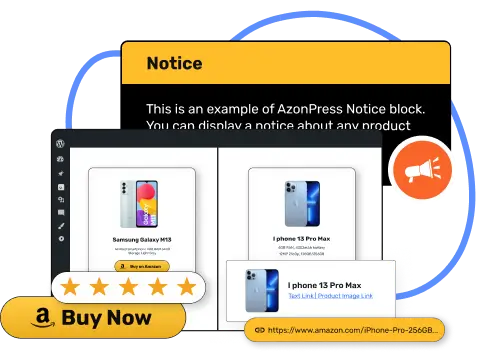






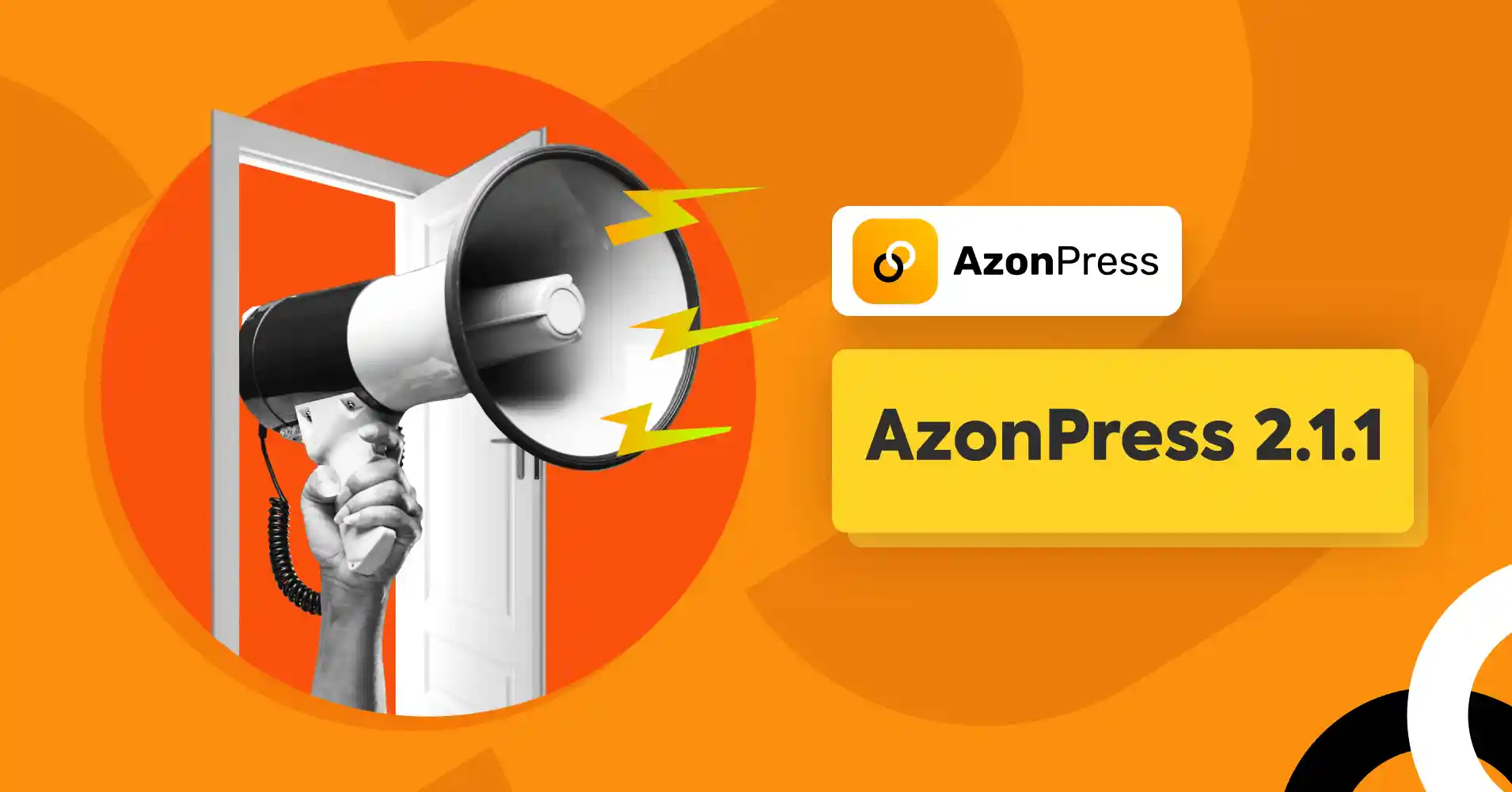




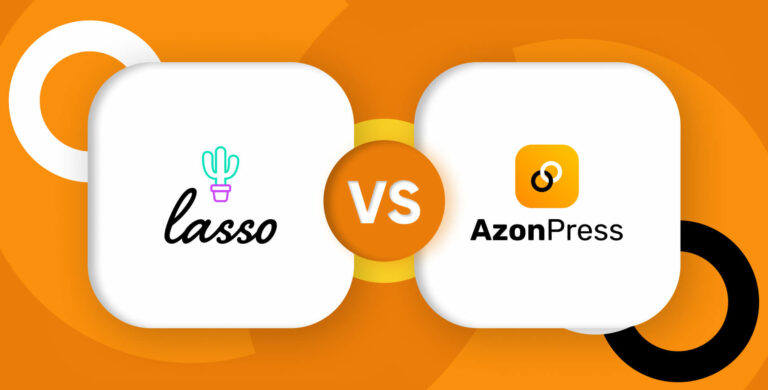
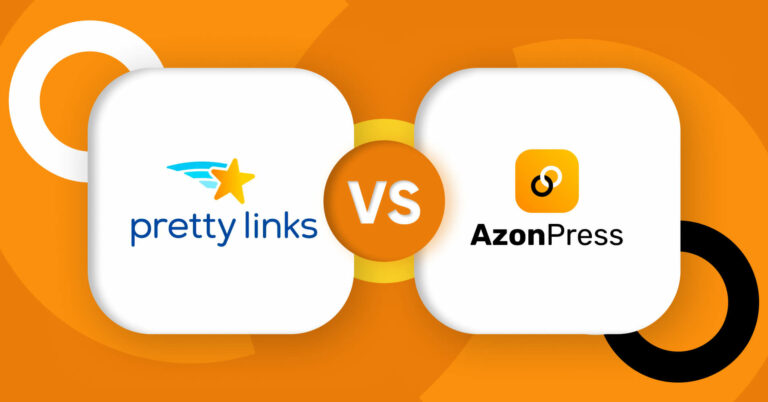
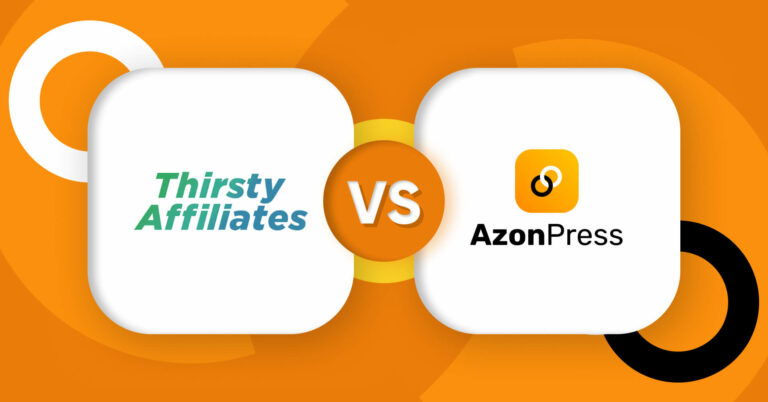
Leave a Reply